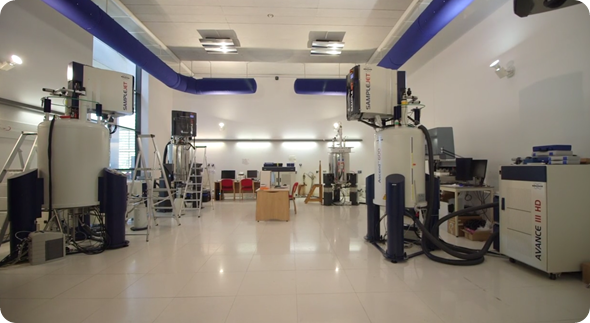An interview with Professor Mark Viant, University of Birmingham, UK, Executive Director of Phenome Centre Birmingham and Director of the NERC Biomolecular Analysis Facility.
Please can you give an introduction to the new Phenome Centre Birmingham, how does this fit into the international network of phenome centres being created?
The new Phenome Centre Birmingham is an eight-million-pound research facility that has been funded by the Medical Research Council, by the University of Birmingham, and by four industry partners, namely, Beckman Coulter, Bruker, ThermoFisher Scientific and Waters. It is a clinical phenotyping centre.
It's the third of the phenome centres to open around the world following the National Phenome Centre at Imperial College, London and the Singapore Phenome Centre.
Opening of the Phenome Center at the University of Birmingham
Opening of the Phenome Center at the University of Birmingham from AZoNetwork on Vimeo.
What impact will the Phenome Centre Birmingham have on metabolomics research?
The Phenome Centre in Birmingham, at least initially, will focus on a lot of the collaborations and research interests of clinical scientists here in the “Birmingham Health Partners,” which is a partnership of different local hospitals and the University of Birmingham itself.
We collaborate strongly with clinical scientists in the local hospitals here in Birmingham. We'll be focusing on the following disease areas: blood cancers, inflammatory diseases, reproductive medicine, endocrinology and a number of other related fields.

What NMR facilities are available in the Phenome Centre Birmingham and who will have access to these?
We are very lucky to have extremely high quality mass spectrometry and NMR spectroscopy facilities. We have two Bruker 600 MegaHertz NMR spectrometers and a total of eleven mass spectrometers from Waters and from ThermoFisher Scientific. Lots of people will have access to these capabilities through the collaborative research service that we offer through the Phenome Centre Birmingham.
How collaborative will the research be here at the Phenome Centre?
Phenome Centre Birmingham's research is naturally going to be collaborative. You can't do metabolomics in a non-collaborative sense. You really need to have the integration of the metabolomics scientists with the clinical scientists and the informaticians and so forth.
Just as our research projects for the last decade in metabolomics have been highly collaborative, we expect exactly that same sort of collaborative mentality in the projects that the Phenome Centre undertakes.
NMR in Metabolomics
NMR in Metabolomics from AZoNetwork on Vimeo.
What do you think the future holds for metabolic phenotyping with regards to medical research and stratified medicine?
These really are exciting times for the future of metabolic phenotyping in medicine. We're at a point now where we have the analytical capability and the computational capability to collect very large data sets, mine those data sets and really find markers that are going to help to stratify patients into different disease groups to try and pinpoint which drugs a particular individual should take versus another individual with apparently the same sort of disease. I think there's great potential right now and in the next few years. We hope to see these metabolite measurements rolling more into the clinical scenario.
How do you hope to raise awareness of metabolomics via the Phenome Centre Birmingham?
Part of Phenome Centre Birmingham's mission and part of the metabolomics research here at the University of Birmingham is to spread awareness of metabolomics. We really are keen to get the word metabolomics out into the general public and for them to have an appreciation of what it means.
Metabolomics has for a long time been the little sister to genomics. Genomics is a term that many lay people and the general public would recognize and know a little bit about, but if you ask them what metabolomics is, they're surely not going to know at all.
One event that we first ran in September 2015 and are re-running again this year is a massive open online course or MOOC. This is an online awareness training course. When we ran it for the first time last year, we had two and a half thousand people including the general public and amateur scientists from across the world taking this online course and learning about metabolomics. The course makes people generally aware of what metabolomics is and what it can do for them.
About Professor Mark Viant
 Mark Viant is a Professor of Metabolomics in the School of Biosciences at the University of Birmingham, UK, Executive Director of Phenome Centre Birmingham and Director of the NERC Biomolecular Analysis Facility, two of the UK’s national metabolomics centres.
Mark Viant is a Professor of Metabolomics in the School of Biosciences at the University of Birmingham, UK, Executive Director of Phenome Centre Birmingham and Director of the NERC Biomolecular Analysis Facility, two of the UK’s national metabolomics centres.
As a passionate advocate for the growth of the metabolomics community, he leads training and outreach through the Birmingham Metabolomics Training Centre and as the ELIXIR-UK Sector Lead for metabolomics.
Mark is also a past President of the International Metabolomics Society. His research programme and interests encompass the development of optimised analytical and computational workflows for metabolomics and the applications of these technologies to investigate the metabolic pathways underlying toxicity and disease, both in the context of human and environmental health.
He is particularly fascinated by chemical and nanomaterial toxicology in ‘non-animal’ invertebrate model organisms, for example Daphnia, and the translation of metabolomics based ‘discovery’ research into mechanistically based tools for chemical safety and environmental diagnostics.
Mark has co-authored over 150 publications and his work has recently been recognised by the award of a 2015 Lifetime Honorary Fellowship of the International Metabolomics Society “In recognition of his pioneering work in environmental metabolomics and for his sustained service to the Society. His vision revolutionized the Society’s operations and reputation, expanding its reach to all corners of the world.”